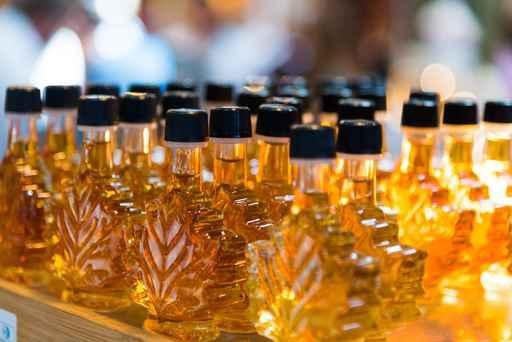A sports drink containing maple syrup is well appreciated during prolonged exercise and appears to be a viable alternatives to more common sources of carbohydrates.
Abstract
Background
Taste and appreciation of sports drinks can affect perceived exertion during exercise. Anecdotal evidence shows that maple products are regularly consumed by recreational and professional athletes but very few studies have reported on their effects during exercise. The purpose of the current study is to report the taste, appreciation and perceived exertion following the ingestion of maple-based sports drinks and other carbohydrate drinks during prolonged exercise.
Methods
Recreationally and competitively active male subjects (n = 76, mass = 73.7 ± 10.3 kg, maximum oxygen consumption (VO2max) = 4.4 ± 0.5 L/min, maximal aerobic power (MAP) = 309 ± 42 W) ingested one of four carbohydrate solutions (all at 60 g CHO/L): concentrated maple sap (MW), diluted maple syrup (MS), glucose (G), a commercial sports drink (CSD), or a placebo (P; water sweetened with stevia) at every 30 min during 120 min of steady-state exercise (SSE) on a cycle ergometer at 66% MAP. Ratings of perceived exertion (RPE, Borg CR-10) were recorded at each 30 min throughout SSE. A questionnaire was administered to assess sensory characteristics (sweetness, acidity, refreshing, and overall taste on a visual analogue scale, converted to decimals from 0 to 1) and appreciation (sweet, acid and overall on a 9-point hedonic scale) 30 min before (immediately after the first ingestion) and immediately after SSE.
Results
Sweetness was perceived to be higher for MW than G and P (pre: 0.60 ± 0.19, 0.51 ± 0.17 and 0.50 ± 0.17 and post: 0.69 ± 0.19, 0.34 ± 0.18 and 0.48 ± 0.22; p < 0.05, respectively) and MS was rated higher than MW for the appreciation of the sweet taste (pre: 6.5 ± 1.5 vs. 4.6 ± 1.8 and post: 6.8 ± 1.8 and 4.1 ± 1.8; p < 0.05, respectively). Furthermore, subjects that had ingested MW, reported a significantly lower RPE than those with P at 120 min (14.1 ± 2.2 vs. 16.0 ± 2.0, respectively).
Conclusions
A sports drink containing maple syrup is well appreciated during prolonged exercise and appears to be a viable alternatives to more common sources of carbohydrates.
Trial registration
NCT02880124. Registered on 26 August 2016.

